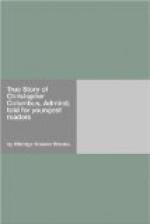On the thirteenth of January, 1494, Columbus sent back to Spain twelve of his seventeen ships. He did not send back in them to the king, and queen, the gold he had promised. He sent back the letters that promised gold; he sent back as prisoners for punishment some of the most discontented and quarrelsome of his colonists; and, worst of all, he sent to the king and queen a note asking, them to permit him to send to Spain all the Indians he could catch, to be sold as slaves. He said that by doing this they could make “good Christians” of the Indians, while the money that came from selling the natives would buy cattle for the colony and leave some money for the royal money-chests.
It is not pleasant to think this of so great a man as Columbus. But it is true, and he is really the man who, started the slave-trade in America. Of course things were very different in his time from what they are to-day, and people did not think so badly of this horrible business. But some good men did, and spoke out boldly against it. What they said was not of much use, however, and slavery was started in the new world. And from that act of Columbus came much sorrow and trouble for the land he found. Even the great war between the northern and southern sections of our own United States, upon one side or the other of which your fathers, or your grandfathers perhaps, fought with gun and sword, was brought about by this act of the great Admiral Columbus hundreds of years before.
So the twelve ships sailed back to Spain, and Columbus, with his five remaining ships, his soldiers and his colonists, remained in the new city of Isabella to keep up the hunt for gold or to become farmers in the new world.
CHAPTER IX. HOW THE TROUBLES OF THE ADMIRAL BEGAN.
Both the farmers and the gold hunters had a hard time of it in the land they had come to so hopefully. The farmers did not like to farm when they thought they could do so much better at gold hunting; the gold hunters found that it was the hardest kind of work to get from the water or pick from the rocks the yellow metal they were so anxious to obtain.
Columbus himself was not satisfied with the small amount of gold he got from the streams and mines of Hayti; he was tired of the wrangling and grumbling of his men. So, one day, he hoisted sail on his five ships and started away on a hunt for richer gold mines, or, perhaps, for those wonderful cities of Cathay he was still determined to find.
He sailed to the south and discovered the island of Jamaica. Then he coasted along the shores of Cuba. The great island stretched away so many miles that Columbus was certain it was the mainland of Asia. There was some excuse for this mistake. The great number of small islands he had sailed by all seemed to lie just as the books about Cathay that he had read said they did; the trees and fruits that he found in these islands seemed to be just the same that travelers said grew in Cathay.




